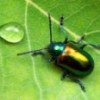New this week at alexanderwild.com we have photographs of the Savanna Strobe Ant Opisthopsis haddoni. These delightfully perky insects inhabit open environments in northern Australia and are one of my favorite ants.
Opisthopsis has excellent vision. The location of the compound eyes atop the head allows it to spot a photographer approaching from any direction and take appropriate evasive action. This wasn't the easiest ant to shoot.
The peculiarly erratic style of walking is also not conducive to photography. The common name "strobe ant" refers to this ant's unpredictable little fits and starts.
Follow the link for more Opisthopsis photos.
photo details:
Canon EOS 50D camera
Canon MP-E 65mm 1-5x macro lens
ISO 100, f/13, 1/250sec





Why not "Stroh's ant?" I have a peculiarly erratic style of walking after enough Stroh's - maybe these ants have the same problem.
Wonderful and unique images, Alex. Photographing these ants must be a lot like imaging certain salticid spiders (as far as their visual acuity is concerned - and their resulting evasive movements).
The 4th image is very unusual - is she standing on glass?
Awesome eyes on that ant. Nice shots.
Are these harder to shoot than non-mutualist [i]Pseudomyrmex[/i]? The mutualists just run out at you, but the non-mutualists are quite evasive.
Oops - obviously not standing on glass in the 4th image - perhaps held in forceps, out-of-frame?
The eyes on top give the head of this species a most grasshopperish look.
It goes without saying, but must be said anyway lest you think we don't notice such things - spectacular photographs!
Alex, are you near-sighted, by any chance?
Thanks guys, for all the kind words and comments!
Dan L- Nearsighted? I don't think I know a single entomologist who isn't.
David- In that shot, the ant was hanging upside-down from the bottom of a piece of paper while she groomed herself. The blue background is the bucket I was using to hold the paper up.
James- Yeah, they're similar to Pseudos- skittish and fast.
Yay! As always, great photos.
Is Opisthopsis by any chance related to Camponotus? I mean, the dorsal view to me sorta makes it look like just a particularly big eyed Camponotus.
That's a sharp eye you've got there, Jason.
Yes, Opisthopsis is a close relative of Camponotus.
Quite uncanny that you post these pics today. I was watching a few of O. haddoni with my little boy just a few hours ago (whilst thinking how difficult they would be to photograph).
@ Ted -- Grasshopperish looking yes, but without sacrificing formicid prognathy.
@ Dan and Alex -- I am far sighted, an inconvenience for an entomologist, to be sure. Reading the darn iPhone's tiny display is probably giving my eyes training in near-sightedness.
Alex
Do you use a tripod when working at home or you relied on your skill for these photos.
These are horrifying! Can you actually see them in the dark?
NS
Gorgeous images, just lovely. And a very comely subject, as ants go.